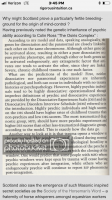Broken man
Member
- Joined
- Sep 11, 2016
- Messages
- 1,693
Oh sorry, I started with the first half (upper) yesterday but was thinking about it more deeply and wrote the second half today. My bad. I fixed it.You can't just say that it's not true and that you don't know if you agree and then not explain lol

